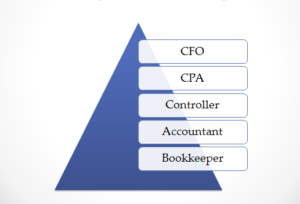It’s Not Just About Numbers, It’s About People
Now that we’ve broken down some of the various activities that take place in your  accounting department, it’s time to get into the key personnel and their roles. Your company may be small with one or two people wearing the multiple hats in the accounting department…or perhaps the entire accounting department is just you! In that case, perhaps it is time to consider outsourcing some of these tasks to others, but first you need to know what areas need to be covered.
accounting department, it’s time to get into the key personnel and their roles. Your company may be small with one or two people wearing the multiple hats in the accounting department…or perhaps the entire accounting department is just you! In that case, perhaps it is time to consider outsourcing some of these tasks to others, but first you need to know what areas need to be covered.
Whether you are a small business with dozens of employees or a “mom and pop shop,” it is still important to understand the individual breakdown and roles of your accounting department, where the boundaries are and how each section should be divided.
The Doctor Analogy – “Which Doctor Are You Seeing?”
We all understand the various roles that doctors play in the healthcare industry. For example, a general practitioner does not specialize in the same fields as a brain surgeon. Their titles reflect their services.
This is also true in the accounting field. Every area of your accounting department has its own focus or specialty and requires the right person with the education and experience necessary to perform that function.
Let’s take a look at the key personnel roles or “specialties” in your accounting department:
- Chief Financial Officer (CFO)
- Certified Public Accountant (CPA)
- Controller
- Advanced Accountant
- Bookkeeper
Chief Financial Officer (CFO) – Your CFO is a C-Level Executive who is responsible for overseeing and managing all the various financial aspects of your business. The CFO is concerned with the long-term success of the company; the company ROI (return on investment) in time, resources and direct investment. Included in the CFO’s role and function are the following:
- Financial Reporting and Analysis
- Financial operations
- Risk management
- Strategic Initiatives
- Treasury/Cash Management
- Tax Planning
- Fund Raising
Certified Public Accountant (CPA) – The CPA is involved at the tax strategy level but typically an external expert and resource. The role of the CPA is primarily focused on and specializes in preparing tax returns. The CPA collaborates with the CFO, providing insights into all aspects of taxes, including a strategic viewpoint, both short- and long-term tax strategies and tax-related business goals.
Controller – This key role serves as the “corporate manager” of a company’s accounting department. The Controller is responsible for:
- Accounting Systems Set-up
- Preparation and reporting of financial statements
- Cost accounting and budgeting
- Supervision and training of accounting staff
- Reconciling bank and credit statements
- Financial controls and documented procedures
Advanced Accountant – The Advanced Accountant roles in your organization is responsible for performing and overseeing the basic, day-to-day functions of the company’s accounting department, including accounts receivable, accounts payable, tax preparation and payment, payroll, internal accounting and accounting systems and operations.
Bookkeeper – Completing our hierarchy of the accounting department is your Bookkeeper. The bookkeeper is responsible for the daily performance of the accounting department’s basic operations, including creating and maintaining invoices for account receivables, writing checks, processing stop payments, requesting and maintaining W-9 information for vendors, filing and document storage.
Whether you maintain these roles in-house, hire outside vendors or work with a financial services outsourcing company, clearly these roles are vital parts of your business operations.
Regardless of how big or small your business is right now, seriously consider taking a closer look at the structure of your own accounting department, where you may have deficiencies in your systems or personnel and make sure you have each of these roles adequately covered. The benefits to your company will be tremendous.

